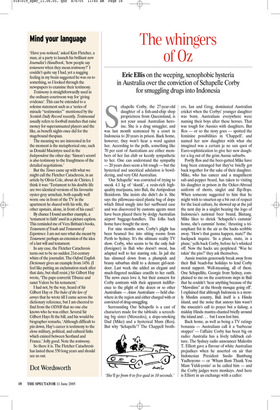Mind your language
‘Have you noticed,’ asked Kim Fletcher, a man, at a party to launch his brilliant new Journalist’s Handbook, ‘how people say testament when they mean testimony?’ I couldn’t quite say I had, yet a nagging feeling in my brain suggested he was on to something, so I looked through the newspapers to examine their testimony.
Testimony is straightforwardly used in the ordinary courtroom way for ‘giving evidence’. This can be extended to a solemn statement such as a ‘series of miracle “testimonies”’ mentioned by the Scottish Daily Record recently. Testimonial usually refers to football matches that raise money for superannuated players and the like, as benefit nights once did for the stagebound thespian.
The meaning we are interested in for the moment is the metaphorical one, such as Donald Macintyre used in the Independent the other day: ‘Simon’s scrawl is also testimony to the fraughtness of the detailed negotiations.’ But the Times came up with what we might call the Fletcher Catachresis, in an article by Olivia Cole, about de Chirico, I think it was: ‘Testament to his double life are two identical versions of his favourite oyster-grey armchair, both equally well worn: one in front of the TV in the apartment he shared with his wife, the other upstairs, alone, in front of his easel.’ By chance I found another example, a ‘testament to faith’ used in a picture caption. This reminded me of Vera Brittain’s books, Testament of Youth and Testament of Experience. I am not sure what she meant by Testament; perhaps an extension of the idea of a last will and testament.
In any case, the Fletcher Catachresis turns out to be no sudden 21st-century whim of the journalist. The Oxford English Dictionary gives an example from 1456. (I feel like putting an exclamation mark after that date, but shall resist.) Sir Gilbert Hay wrote, ‘The pape convertit Tiburce and sanct Valere be his testament.’ I had not, by the way, heard of Sir Gilbert Hay or The buke of the law of armys that he wrote till I came across the dictionary reference, but I am cheered to find from the ODNB that no one else knows who he was either. Several Sir Gilbert Hays fit the bill, and his would-be biographer remarks, ‘Although difficult to pin down, Hay’s career is testimony to the close military, political, and cultural links which existed between Scotland and France.’ Jolly good. Note the testimony.
So there it is. The Fletcher Catachresis has lasted these 550 long years and should see us out.


















































 Previous page
Previous page